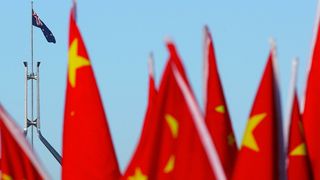China’s deputy ambassador to Australia, Wang Xining, last week suggested there were "no historical irritants" in Australia’s relationship with China.
Given the deep freeze of recent times and the aggressive tone of some of his colleagues in other Chinese embassies, these comments, to the National Press Club in Canberra, might easily be dismissed as diplomatic flummery.
But this is not the first time that formulation has been used. In the late-1970s Australia’s ambassador to China, Garry Woodard, was told by a Chinese official that there were "no problems left over from history" to bedevil the relationship.
It affirmed that in China's eyes, Australia carried none of the baggage associated with the historical memories or big power dynamics that typified Beijing’s relations with Japan and the United States.
Coming in the shadow of the Vietnam War, the demonising of China that had taken place throughout the Cold War, and the legacy of White Australia, it was a remarkable statement. It affirmed that in China's eyes, Australia carried none of the baggage associated with the historical memories or big power dynamics that typified Beijing’s relations with Japan and the United States.
Australia was not tainted by association with the Western powers which had inflicted a "century of humiliation" on China.
Wang’s speech is now barely audible above the din of continued parrying between the two countries on issues related to trade and foreign investment. One address, mixed with both the conciliatory and the combative, will not break the ice. But it is worth pondering at the very least that Beijing, as much as Canberra, might not have completely slammed the door shut on rebuilding some kind of broader relationship.
As the US presidential election approaches, it is timely to assess the strategy of successive Australian governments in handling one of the most challenging security environments the country has ever faced. Two strands have been clear since 2017. Both have been broadly successful, yet both sag somewhat under the weight of recent strains.
The first has been to keep an erratic President Donald Trump from putting his foot on Australia's neck. That has meant satisfying the security establishment in both Canberra and Washington that Australia is a strong, loyal US auxiliary in Asia. A primary purpose of that policy has been one of public reassurance that Australia will not be left on its own in the region.
The second has been a set of clear lines about what the government will and will not accept in terms of Chinese pressure and coercion. On foreign interference laws, Huawei and the Pacific "step-up", for example, the government has acted on legitimate national interest grounds. Driven by a tough realism on China, Prime Minister Scott Morrison has put down clear markers and sent a strong signal to Beijing about where Australia stands on such questions now and in the future. That has been an entirely necessary development.
In response to a US-China policy steadily becoming an ideological crusade, the government has signalled it will not join such an existential struggle. Morrison has eschewed the language of the "new Cold War". His language on China has been, for the most part, disciplined.
At the same time, in response to a US-China policy steadily becoming an ideological crusade, the government has signalled it will not join such an existential struggle. Morrison has eschewed the language of the "new Cold War". His language on China has been, for the most part, disciplined.
That some Americans are asking, incredibly, "Who lost Australia?" is a sign not of an alliance in crisis but rather a window into future US frustration if Australia is not with them all the way on China. But Australia cannot follow America headlong down a decoupling path, particularly on trade and higher education.
What remains something of a puzzle, however, is the mixture of government responses to China. Briefings to journalists now stress that Canberra is playing the "long game" with Beijing, a strategy that reserves Australia's right to discuss areas of sensitivity in the relationship and human rights flashpoints in Hong Kong and Xinjiang.
This is all to the good, but the "long game" also requires a patient, public explication of the policy itself.
For where the government has sometimes run into difficulty is its tendency to be the first and loudest of the hailers on China. Subtlety and guile, so often needed in diplomacy, have been in short supply. In the gloating to Trump on the 5G decision, in the call for an independent pandemic inquiry, and by invoking the 1930s analogy, Australia has looked at once brazen and inauthentic. For all the existing differences between the US and Australian positions on China, the perception amongst some South-East Asian nations is that Australia remains too willing to do Washington’s bidding.
But Australia does not need to enlarge its ANZUS commitments. Despite bellowing on Taiwan from predictable voices in Canberra, the lessons of Vietnam, not to mention Iraq, should be learnt. Australia would be wise not to put itself in a position where the US can say – as former president Eisenhower did to Lyndon Johnson in 1965 – that Australia’s commitment bolstered its moral justification for America to go to war. Washington would not be concerned in the least about how this might affect Australia’s standing in the region. And pressure from Washington for some kind of public commitment is likely to increase.
Playing the "long game", however, risks allowing domestic political imperatives to overwhelm and in some cases be used to churn Australian foreign policy.
Once more, as has happened at several points since diplomatic relations opened with the PRC in 1972, various crises have exposed the ease with which older images of a "China threat" can be mobilised and deployed.
In Australia’s China debate, references to the "guns of August" or "Munich" conjure Armageddon but miss the point. The closer comparison to the current circumstances is what happened to the debate over Australian foreign and defence policy in the 1920s and 30s as a result of the toxic conscription debates of 1916-17. Because the issue of "loyalty" played so central a role in those debates, critical questions over Australia’s external policies in the succeeding two decades could not be treated on their own terms. Rather they became captive to poisonous finger-pointing over patriotism.
Australia could well be headed for a repeat of that era. The government’s tough line on China has won wide popular support. Public trust in China has collapsed. Once more, as has happened at several points since diplomatic relations opened with the PRC in 1972, various crises have exposed the ease with which older images of a "China threat" can be mobilised and deployed.
Foam bubbles on the front pages of the tabloid press; press outlets publish maps of Australia disappearing beneath swelling red tides. Sources recently told The Australian Financial Review's Andrew Clark that Morrison had hit on "a political sweet spot where he can stand up for Australia’s sovereignty but also use the 'China card' as his trump in the next federal election".
That may well be the trajectory for Australia’s China relationship. Such a scenario sees Canberra’s steely-backed commercialism in dealing with China continuing awkwardly alongside a continued downwards spiral of China-bashing and public framing of China as the "enemy", with all the attendant ramifications for social cohesion and the continued, ugly questioning of Chinese-Australians’ loyalty and Australianness.
In his compelling 1994 book Australia’s China – a must-read for anyone debating this question – historian Lachlan Strahan argued that Australian representations of China do not "swing from one pendulum to another". Rather they are "dynamic and complex, sometimes moving forwards, sometimes sideways and sometimes backwards".
Positions in Australia’s China debate are deeply entrenched. But Strahan’s judgment is worth bearing in mind. Locking ourselves into the permanence of "pushback" is as unwise as continuing to imagine the era of engagement returning in its old form.






